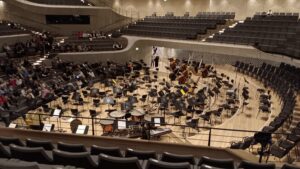Another “off-topic” post, this one about a wonderful concert I attended while I was in Germany. It was at the Elbphilharmonie in Hamburg on May 5. That’s a significant date, just two days short of the 200th anniversary of the first performance of Beethoven’s Ninth Symphony.
The two pieces were Schoenberg’s A Survivor from Warsaw and the Ninth. Alan Gilbert conducted the NDR Elbphilharmonie Orchestra and the Runfunkchor Berlin. Soloists were Susanna Phillips (soprano), Gerhild Romberger (alto), Maximilian Schmitt (tenor), and Michael Nagy (baritone).

I’m not a huge fan of Schoenberg, aside from his early Verklärte Nacht. However, his style is appropriate to the subject matter of A Survivor from Warsaw. The October 7 massacre and the subsequent reprehensible demonstrations for removing Israelis “by any means necessary” “from the river to the sea” hadn’t happened when this piece was scheduled, so the organizers couldn’t have known how appropriate it would be. The piece is a narration representing the tale of a person in the Warsaw Ghetto who wasn’t killed only because he fell and was left for dead. It tells of a Nazi sergeant calling out the Jews, treating them brutally, and ordering them to count off so he’d know how many he was sending to die. The count turned into a tumult, and in the midst of the noise they began singing the old hymn, the Shema Yisrael. The hymn is the only tonal part of the piece. The rest of the music is as brutal as the events it describes. There’s an inconspicuous bit for the xylophone which John Williams just possibly picked up for the Star Wars Imperial March.
There was no chorus on the stage, although the piece calls for one for the concluding hymn. Having been to the Elbphilharmonie before, I figured they had a surprise in store, and they did. When the piece reached the Shema Yisrael, singers in one area of the audience, dressed in varying clothes, got up and sang. Did I mention that the Elbphilharmonie has wonderful acoustics no matter where you are in the hall?
When the piece came to a crashing end, there was dead silence for a good ten seconds. I think the audience was just stunned; I know I was. Can you really applaud such a depiction of real-life horror? It’s not clear if the event happened as depicted, but that’s not the point. Apart from the hymn, similar things definitely happened in Warsaw. Once the shock was over, the piece got a strong round of applause.
That’s only a seven-minute piece. If you haven’t heard it and Jewish history interests you, I recommend finding an online recording and hearing it. The narration is in English, though the quotations from the sergeant are in German and the hymn in Hebrew.
The orchestra went directly from the Schoenberg to the Beethoven Ninth without an intermission or even much of a pause. Perhaps there should have been more breathing space between the two entirely dissimilar works.
I’ve heard the Ninth at least a hundred times, but I can’t recall ever hearing it in a live performance before. At my age, memories of concerts on TV blend with in-person events. Hearing it in a live performance, not far from the stage, gave it a greater impact than anything else since my first hearing of it.
“Not far from the stage” is important. The Elbphilharmonie has seats on all sides of the stage, none of them very far away. The acoustics are excellent everywhere, but it makes a difference where you sit. My seat was closer to the percussion and trumpets than any other instruments, making the work sound more aggressive than it might have from in front of the stage. The performance may have been a bit on the aggressive side in any event. The recapitulation of the main theme in the first movement is one of the most frightening moments in Beethoven, and it made me jump a little even though I knew exactly what was coming.
The singers came onstage before the third movement. When the tenor sang, “O Freunde, nicht diese Töne,” it was a moment I’m extremely familiar with, but it made much more of an impression on the live stage: a solitary, unaccompanied voice silencing the tumult that just happened.
The Ninth is a murderous piece to perform. The singers have to hit high notes pianissimo. The trombones don’t play a note till the middle of the fourth movement, then they’re completely exposed. The horns have beautiful and difficult parts in the third movement. (I would like the third movement of the Ninth to be the last thing I hear in my life.) A horn player glitched just slightly, just enough to notice. You can’t re-record a live performance and throw away the bad takes; that’s a big part of what makes it so exciting.
In the USA, classical audiences will give a standing ovation to any reasonably competent performance. In Europe, it has to be earned. This one was. It got a sustained, loud standing ovation with many bows from the performers (including one to the people seated behind the stage).
My trip to Germany was a little longer than it otherwise would have been, so I could get to both this concert and the convention I came to the country for. It was worth it.